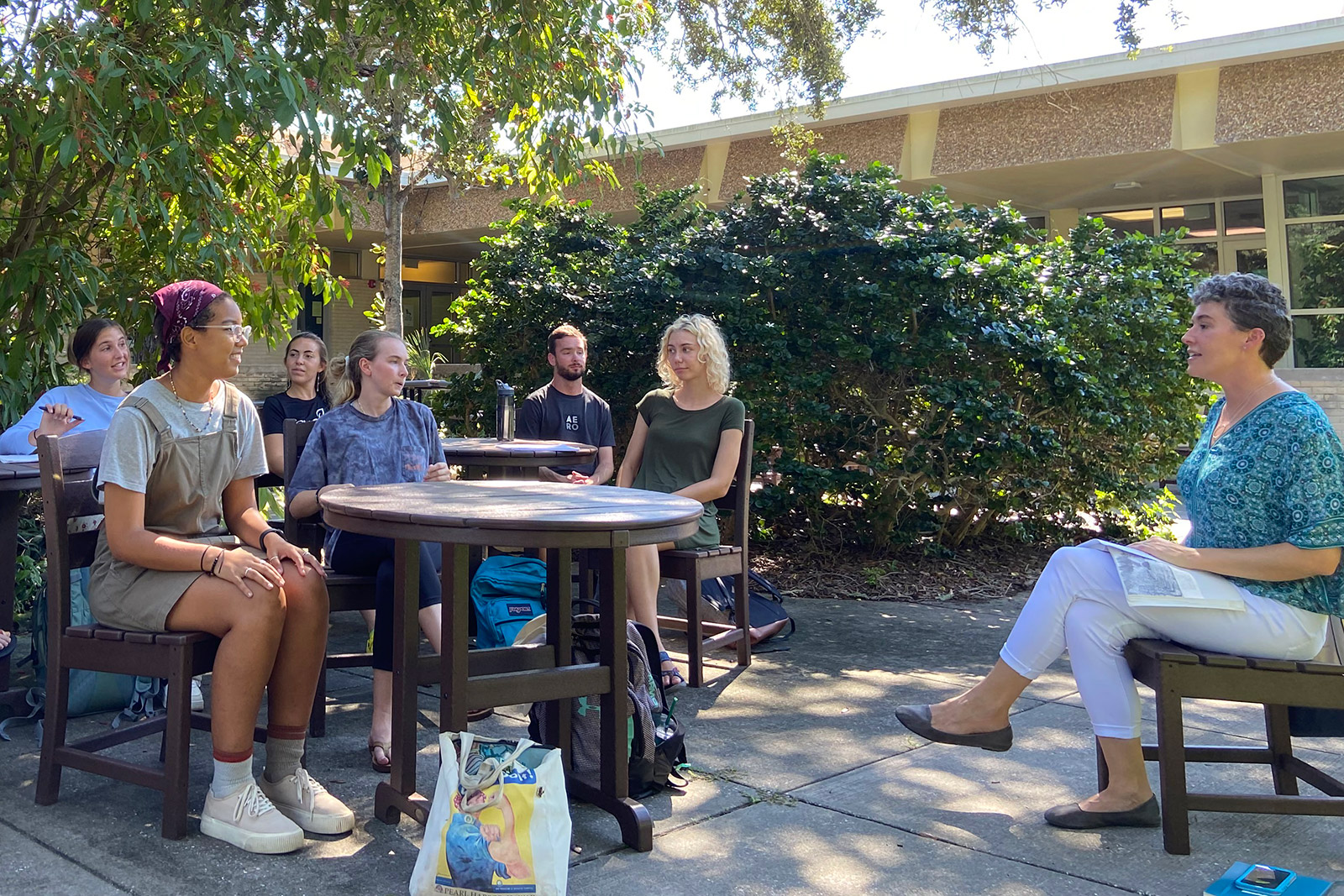
Assistant Professor of Environmental Studies Joanna Huxster (far right) engages students including senior Alex Gordon (second from left) outside Sheen Complex. Photo: Michel Fougères
In February 2015, U.S. Senator Jim Inhofe (R-Okla.), who had labeled climate change “the greatest hoax ever perpetrated against the American people,” brought a snowball with him to the Senate Chamber. “Catch this,” he said as he tossed the snowball to an aide, adding that it was cold outside. According to the National Oceanic and Atmospheric Administration, 2015 would turn out to be the fourth warmest year on Earth since record keeping began in 1880.
“That story,” says Joanna Huxster, Ph.D., assistant professor of environmental studies at Eckerd College, “is a perfect example of how our observations can trick us. But it’s so compelling to hold a snowball.”
“Unfortunately, that’s like taking a ruler and putting it on the ground and saying the Earth is flat.”
Climate change and COVID-19 are prime examples in the discussion about how scientific information can be manipulated.
Trying to sort out what information is accurate and what isn’t can be frustratingly difficult, says Huxster. If anyone would know, she would. She studies the public’s understanding of environmental issues and teaches classes on environmental and climate change communication. There’s a waiting list to get in both classes.
“The issues are very polarized,” Huxster says. Whether someone identifies as conservative or liberal is one of the main dividing lines, she points out. “Age can also factor into people’s sense of urgency, but political ideology seems to be the true driver.”
Partisanship in the media doesn’t help.
Huxster, who earned her undergraduate and doctorate degrees from the University of Delaware, says her focus also is on studying and testing effective communication techniques “for increasing public understanding of science and inspiring action on environmental issues.” In other words, which messages work and which don’t.
Can we blame this on the internet and the countless sources of good and bad information? Yes and no, she says. “The internet has absolutely spread more information more quickly. But what is unique is that we’ve never been as politically polarized as we are right now.”
And it goes beyond that. “For climate change, a large part of the disinformation was funded by the fossil fuel industry. The oil industry followed the playbook of big tobacco and did an incredible job of sowing doubts about climate change. They knew fossil fuels were causing climate change as far back as the late 1970s.”
With an issue as massive as climate change, Huxster is seeing students who have a lot of anxiety. And it’s not unfounded. “We’re at a big precipice right now,” she says. “I’m really interested to see how it plays out. … I want to feel like these are conversations the students aren’t scared to have. And I want them to consider how they can become involved in meaningful and effective campaigns to deal with climate change. That they know how to take action beyond changing their lightbulbs.”
“But my students also give me a lot of hope. Young people are ready. They want to know what they can do.”
Young people like Alex Gordon. “It was really daunting in the beginning,” says Alex, a senior environmental studies and political science student from Houston, Texas. “But 10 times out of 10, when I leave class I generally feel good about the direction we’re heading. We’re all leaving with the skills to make a difference, and I see there are other people like me willing to take on the challenge.”
“To have people like Dr. Huxster to make sure we have the education we need is really comforting.”












